After two evenings of chamber music in the Recital Hall at UNCG, the Eastern Music Festival (http://easternmusicfestival.org) presented its first concert in its “home,” Dana Auditorium on the Guilford College campus. This Tribute to Van Cliburn, who passed away earlier this year, featured both music that he recorded as well as “the type of music he performed.” The three pianists were EMF faculty members Gideon Rubin, William Wolfram, and James Giles.
The evening began with two works by Richard Wagner, who was born 200 years ago. Although the opera composer didn’t really write anything for the piano, Franz Liszt knew a good thing when he heard it. Virtuoso pianist Liszt transcribed an immense amount of orchestral literature for the piano, providing musicians of his day the opportunity to play and hear great orchestral and operatic music when concert performances were not as common as today. And of course, Liszt also played many of his transcriptions in his own recitals.
William Wolfram played “Pilgrim’s Chorus” from Tannhäuser with an emotional depth befitting this moving hymn. His sensitive and solid performance displayed wonderful voicing of the chorus as well as ample technical facility to negotiate the fiendish virtuoso passages.
“Lohengrin’s Admonition” from Lohengrin, like the Tannhäuser work, is an almost literal transcription of the opera score. But the way Liszt arranges the various colors of the orchestra and especially the artistry with which Wolfram brought those colors to life was a delight to the entire audience.
James Giles followed a very different course, playing several pieces written specifically for the piano. Franz Schubert’s Three Pieces, D. 946 comprise a 20-minute foray into classically chiseled romantic fare. These pieces, composed some six months before the composer’s death, are not often heard in concert. Each is sectional, presenting several contrasting moods in turn. Giles’ conception of the work and sensitive phrasing made the progression easy to follow, from the rambunctious opening through the serene middle to the sprightly, good-humored conclusion.
Perhaps more engaging were the four gems that followed. Alexander Scriabin’s Prelude in B-flat Minor presented a Chopinesque melody over an undulating left hand. Nicolai Medtner’s “Fairy Tale” in the same key was a bit more Lisztian. Dmitri Shostakovich’s Prelude in A-flat Major begins simply enough, but several dashes of impudence liven up the work. Giles’ colorful playing and his lovely touch brought out the subtleties of these exquisite works.
There is nothing subtle about Giles’ final offering, Sergei Prokofiev’s Toccata, a whirlwind affair that the pianist took at break-neck speed. The result was exhilarating.
Gideon Rubin performed Johannes Brahms’ Variations and Fugue on a Theme by Handel with finesse and intensity. The 25 variations, based on a tune from one of Handel’s harpsichord suites, were ranked among “the half-dozen greatest sets of variations ever written” by renowned musicologist Sir Donald Tovey. Suffice it to say that Brahms pushed the envelope when writing these, as the theme becomes almost impossible to discern in some of the later variations, where the main idea may have been derived from the preceding variation.
Rubin brought focused concentration to his performance, which resulted in a tightly held together voyage through the intricate and virtuosic landscape. The final fugue was a tour-de-force, a fitting conclusion to the 25-minute work.
Rubin was joined by Giles for two movements from Rachmaninoff’s Suite for Two Pianos (Romance and Tarantelle), affording a quasi-encore to the evening. These gorgeous gems luxuriate in hyper-romanticism, with waves of beauty and swelling climaxes. The work divides the important material evenly between the two pianos, and both pianists were sensitive to who had the main material at the moment. Ensemble between the two was spot on as well.











